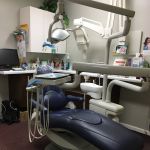How to Clean Dentures Properly: A Step-by-Step Guide for Maintaining Your Smile
If you're wearing dentures, keeping them clean is essential for your oral health and overall comfort. Proper denture care ensures they remain in good condition, prevents bad odors, and helps you maintain a confident smile. Whether you're new to dentures or have been wearing them for years, it’s important to know how to clean dentures properly. In this guide, we will walk you through the steps for cleaning your dentures effectively, discuss common mistakes to avoid, and explain the benefits of proper denture care.
- 1. Importance of Cleaning Dentures
- 2. Steps to Cleaning Your Dentures
- 3. What to Avoid When Cleaning Dentures
- 4. Using Denture Cleaning Products
- 5. When to See Your Dentist for Denture Care
1. Importance of Cleaning Dentures
Cleaning your dentures regularly is vital not only for maintaining their appearance but also for preventing oral health issues. Over time, food particles, plaque, and bacteria can build up on dentures, just like they do on natural teeth. This can lead to bad breath, gum irritation, and infections. Regular cleaning helps prevent these issues and keeps your dentures in top shape, allowing you to enjoy eating, talking, and smiling without worries.
2. Steps to Cleaning Your Dentures
Proper cleaning of your dentures involves several steps to ensure they are thoroughly cleaned and free from harmful bacteria:
- Rinse After Eating: After every meal, remove your dentures and rinse them under warm water to wash away any food debris.
- Brush Daily: Use a soft-bristled toothbrush designed for dentures to gently brush them. Make sure to clean all surfaces, including the grooves that fit against your gums. Do this daily to remove plaque and bacteria.
- Soak Overnight: Soaking your dentures overnight in a denture cleaning solution helps to disinfect them, remove stains, and maintain their shape. Be sure to follow the manufacturer’s instructions when using the solution.
- Check for Damage: Before cleaning, always check for any cracks or chips in your dentures. If you notice any damage, visit your dentist for repair or replacement.
3. What to Avoid When Cleaning Dentures
While cleaning your dentures is important, there are a few mistakes you should avoid to ensure the longevity of your dentures:
- Avoid Abrasive Cleaners: Do not use toothpaste or abrasive cleaners on your dentures as they can scratch the surface and make them more prone to staining.
- Never Use Hot Water: Hot water can warp dentures and cause them to lose their shape. Always clean dentures with lukewarm water.
- Avoid Using Household Cleaning Products: Household cleaning products are not designed for dentures and can cause damage. Stick to denture-specific products.
- Don’t Skip Cleaning: Avoid skipping cleaning sessions. Even if your dentures feel clean, bacteria and plaque can still build up, leading to potential health issues.
4. Using Denture Cleaning Products
There are a variety of cleaning products available for dentures that help maintain hygiene and extend their life. Some options include:
- Denture Cleaning Tablets: These tablets dissolve in water and are designed to remove bacteria, stains, and odors. Soaking your dentures overnight in a denture cleaning solution is an effective way to keep them fresh.
- Non-Abrasive Denture Paste: This paste is specially formulated for dentures and is gentler than regular toothpaste. It can help remove plaque and stains without damaging the surface of the dentures.
- Denture Brushes: Soft-bristled brushes are designed to clean dentures gently without causing scratches. Use a brush specifically made for dentures to ensure a proper clean.
5. When to See Your Dentist for Denture Care
Even with regular cleaning, your dentures may need professional care from time to time. It's important to visit your dentist if you notice any of the following:
- Your dentures are uncomfortable or don't fit properly.
- There are visible cracks, chips, or discoloration.
- You notice signs of gum irritation or infection.
- You’re having difficulty cleaning your dentures or they no longer feel fresh.
Your dentist can assess the condition of your dentures and perform repairs if necessary. They can also provide guidance on proper denture care and help prevent potential problems.







 Kansas City Smiles & Co, Independence MO5.0 (722 review)
Kansas City Smiles & Co, Independence MO5.0 (722 review) Scott Earp DDS, PA4.0 (122 review)
Scott Earp DDS, PA4.0 (122 review) Kay Family Dentistry5.0 (186 review)
Kay Family Dentistry5.0 (186 review) Cherokee Family Dental4.0 (585 review)
Cherokee Family Dental4.0 (585 review) Sage Dental of Downtown Orlando4.0 (541 review)
Sage Dental of Downtown Orlando4.0 (541 review) Charles A. Messa Jr. DDS4.0 (14 review)
Charles A. Messa Jr. DDS4.0 (14 review) The Importance of Oral Health Education During Pregnancy for a Healthy Pregnancy
The Importance of Oral Health Education During Pregnancy for a Healthy Pregnancy Best Tips for Brushing Your Teeth Properly for Healthy Gums: Essential Techniques for Oral Health
Best Tips for Brushing Your Teeth Properly for Healthy Gums: Essential Techniques for Oral Health Why Skipping Dental Checkups Can Lead to Bigger Oral Health Problems
Why Skipping Dental Checkups Can Lead to Bigger Oral Health Problems Advantages of Porcelain Dental Restorations
Advantages of Porcelain Dental Restorations How Can Diabetes Cause Tooth and Gum Problems? Preventing and Managing Oral Health Issues
How Can Diabetes Cause Tooth and Gum Problems? Preventing and Managing Oral Health Issues Healthy Habits for Promoting Good Oral Health and Hygiene: Tips for a Healthy Smile
Healthy Habits for Promoting Good Oral Health and Hygiene: Tips for a Healthy Smile